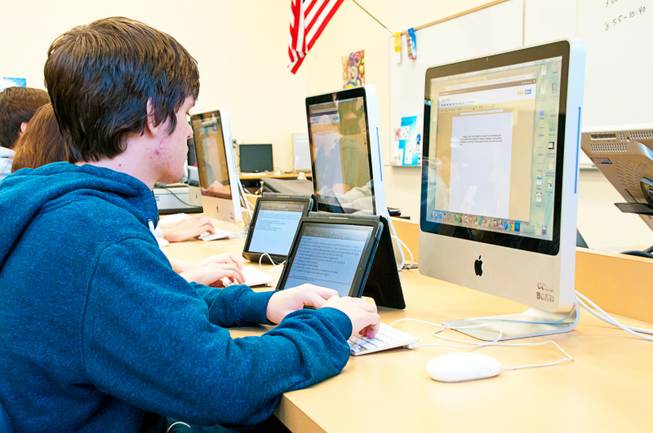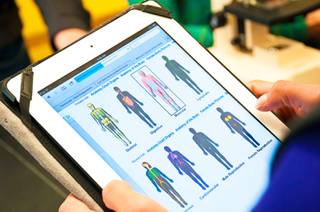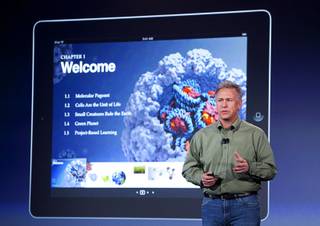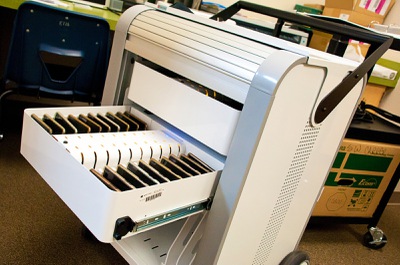
Students at Southwest Career and Technical Academy High School utilize iPads, in addition to iMac computers, during 3D Graphics class, Thurs. Jan. 19, 2012. The school has been recognized as an Apple Distinguished School due to students utilizing digital technology to enhance their learning experience.
Thursday, Jan. 19, 2012 | 7:01 p.m.
Sun coverage
As Apple Inc. poises to reinvent the textbook market — as it did with the personal computer, music and telecommunications industries — the Clark County School District is looking within its own ranks of digitally pioneering schools to navigate the new classrooms of the 21st century.
The California-based technology company unveiled on Thursday its latest iPad application, iBooks 2, which promises to be a one-stop shop for all future electronic textbook sales. This is an update to Apple’s iBooks, which has sold thousands of digital novels, or e-books, since it launched along with the iPad tablet two years ago.
Schools across the country have seemingly embraced the iPad as a supplement and eventually replacement to the traditional paper textbook as publishing companies began developing e-textbooks and classroom applications.
Currently, 1.5 million iPads are being used in schools, and textbook and software companies have developed some 20,000 educational apps for the iPad so far, Apple said.
The new e-textbooks on the iPad will be priced at $15 or less — cheaper than paper textbooks that may cost upwards of 10 times as much. Unlike traditional textbooks, e-textbooks will be interactive with questionnaires and quizzes, photo slide shows, videos, 3-D diagrams and models. Students reading textbooks on the iPad will be able to easily highlight text, add notes, search definitions and terms and create digital flashcards to study. Furthermore, teachers will be able to create their own digital textbooks easily using Apple’s new iBooks Author feature.
“It’s definitely a step in the right direction,” said Jhone Ebert, the School District’s chief technology officer, on Apple’s announcement. “Schooling in the 21st century isn’t what it was when we were growing up. For students to be competitive in the digital world, they need to be able to research and use technology to learn.”
•••
The Clark County School District is gradually adopting Apple iPads, rolling out a number of pilot programs at several schools over the past two years. It’s a bold move by the cash-strapped district, which was criticized two years ago for purchasing $1 million worth of iPads for administrators. (The School District is currently seeking $39 million in concessions from its teachers union to balance its budget, a contentious proposal that has brought hundreds of protesting teachers to recent School Board meetings.)
CCSD iPad Pilot Program
The Clark County School District launched a pilot program using an iPad application to teach algebra to students at four schools during the 2011-12 school year. There will be 1,150 students using the algebra application on the iPad, developed by Houghton Mifflin Harcourt. The iPads with software cost the School District $790,050.
At the beginning of this school year, the School District distributed more than 1,100 iPads loaded with an interactive algebra textbook and application to students at four schools: Silverado High School, Silvestri and Leavitt middle schools and the Academy of Individualized Study. The one-year trial program is costing the School District $790,050.
Explore Knowledge Academy, a charter school opening a new campus next month in the eastern valley, became the first “iSchool” in Nevada this past fall when it provided iPads and Apple technology to each of its more than 600 students in kindergarten through 12th grade. The technology upgrade was part of a $4 million campus development project — which included a campus and infrastructure renovation, paid for by the charter school’s foundation. (Public charter schools such as EKA are overseen by the School District or the state, but are given more academic and budgetary freedoms in exchange for greater accountability and scrutiny.)
School officials argue the tablets — which cost $500 to $800 — provide a relief from the mounting costs associated with replacing aging or outdated paper textbooks and computers. Administrators and some teachers say these devices also improve student engagement and achievement, although preliminary studies show mixed results.
Researchers and district officials say it’s too early to tell if the influx of new technology will prove cost-effective in the long run or deliver higher test scores. Technology is just one of many factors that determine student outcomes in the classroom and on tests. However, an ongoing New York Times series calls into question the billions of dollars school districts are spending nationwide on technology without conclusive proof it improves test scores or student achievement.
The Times looked at the Kyrene School District in Arizona, which invested about $33 million in laptops, interactive “smart-boards” and education software since 2005. Test scores in reading and math have remained stagnant during that time, according to the article.
However, a study being released Friday by textbook publisher Houghton Mifflin Harcourt found improvements among Riverside, Calif., students using its HMH Fuse Algebra application.
Students using the iPad application scored on average 19 percentage points higher than students who didn’t use the software, and were “more motivated, more attentive in class, and more engaged with Algebra content relative to students using textbooks,” according to the report. Clark County’s preliminary results with the application are not in yet, because the first semester is just ending, Ebert said.
Although technology’s impact on student achievement is largely inconclusive, the School District has ramped up its preparations for its full adoption in high hopes it would help raise Clark County students’ test scores and graduation rates.
The district recently completed installing Wi-Fi in all 357 schools, which would allow mobile devices such as laptops and iPads to be used in classrooms. The wireless Internet initiative was paid for using leftover funds from the 1998 construction bond program.
The goal eventually is to allow students to bring their own electronic devices to school to take notes, complete assignments and tests, and even take high-stakes state exams such as the Criterion Referenced Test and High School Proficiency Exam.
This year, fifth- and eighth-grade students were required by the state to complete their written portion of the CRT on the computer — a first for the state, Ebert said.
•••
Apple’s announcement on Thursday only fueled the excitement for digital education at Southwest Career and Technical Academy, one of the first schools in Clark County to adopt the iPad and Apple’s iPod Touch — a popular Internet and software enabled music player — in the classroom.
The magnet school was recently named an Apple Distinguished School for providing students at school and at home with a “21st century learning environment.” The southwest valley high school was the only high school in Nevada, and one of just 56 schools across the nation, to receive the designation from Apple Inc.
“It’s well-deserved. The school is just amazing,” Ebert said. “They really opened up with the mindset that they were going to change education through technology.”
Southwest CTA has become the School District’s main testing ground for Apple technology — from iMac computers, iPads and iPod touches — and perhaps a model of how other Clark County schools could adopt digital tools, applications and textbooks into their curriculum in light of Apple officially entering into the educational realm.
Opened three years ago, the high-performing high school offers 11 career technical programs in culinary, hospitality, nursing, respiratory therapy, dental assisting, auto, fashion, interior design engineering, web and video game technology. Even in specialized nonscience courses like fashion or in traditional core subject areas like biology, iMac computers, iPad tablets and iPod players are being used by students to do research, create projects and collaborate with peers and teachers.
Even before stepping onto the 1,400-student campus, located at 7050 W. Shelbourne Ave., visitors are greeted by signs with QR codes — special bar codes that allow mobile devices to access websites with information about the school. These QR codes are displayed on classrooms doors, linking to the corresponding teacher’s syllabi, calendar and website.
Southwest CTA opened with hundreds of shiny iMac and MacBook Pro computers. Two years ago, the school bought 446 iPod Touch players. This year, the magnet distributed 200 iPads to seniors who opted into the program, and plans to roll out 220 more for the junior class next semester, said Stacy LeFevre, the school’s education computer specialist.
“We’re always trying to push the technology forward,” she said. “If it’s used correctly in the classroom, we’re going to see leaps and bounds in how well students do on tests and how they approach learning. They just love it — juniors are chomping at the bit for the new iPads.”
The iPads don’t have any textbooks loaded on them — yet. Instead, teachers have downloaded free or cheap educational applications such as graphing calculators, interactive science models and sketching tools to help students learn.
“Technology levels the playing field because there’s virtually an app for everything,” said Principal Felicia Nemcek. “(Students) can accomplish more outside of class so it’s reviewing concepts when they’re in class. They can learn it at a much deeper level and gives students access to more information.”
•••
Thursday morning found a handful of students in Jennifer Conder’s advanced-placement biology and anatomy classes dissecting a cat. Before delving into the carcass with gloves and scalpel, students studied organs on a $15 Virtual Body application, which allows students to learn about the human body through 3D models. As they explored the cat’s anatomy, they were told to snap photos of certain body parts and identify them.
About 100 of Conder’s 150 students across several classes use iPads, she said. The rest use iPod Touches, or bring their own laptops or devices to class. Students must pay a $45 insurance fee to receive an iPad on loan; scholarships are available to students who want an iPad but cannot afford the cost.
While Conder admits she has caught a few students who have played games in class or found ways around the firewall, she said she sees more good in using the technology. Students will always find loopholes from installing Pac-Man games on graphing calculators to using smartphones to look up information, she said.
“These kids are going to have to be able to use all the resources out there, and learn to use them appropriately,” she said, adding that students learn about copyright and how to attribute sources properly. “I feel like I’m making a difference since my kids will be more prepared to use technology to their advantage.”
Nemcek has spent about $170,000 on the iPads over the past two years. It’s an investment that she says will prove cost-efficient over the long haul. Ebert said the School Board believes this as well, and has been asking her technology department when they could implement e-textbooks. Perhaps the time is now, she said.
As a result of free applications and tutorials, the iPads have eliminated the need for Southwest CTA to purchase paper novels for English classes and $100 graphing calculators for math classes, Nemcek said. The school saves on reams of paper because students submit assignments electronically. Because tablet computers are generally cheaper than laptops, computers may need to be replaced less often, she said.
And with Apple entering into the textbook market, Nemcek is expecting to save even more. The Campbell’s Body textbook in Conder’s biology and anatomy classes costs $175. A similar textbook on the iPad may cost less than a 10th of that amount.
Further, once an application is purchased, updates are free. However, some e-textbooks may work differently with each update costing schools, said Joe Blumenfeld, the senior vice president for textbook publisher HMH. Ebert said she plans to study the matter, adding that additional costs may incur from having to instruct teachers on how to use the new technology effectively in their classrooms.
Regardless of the cost, Nemcek is adamant the influx of technology at Southwest CTA is helping to engage more students, resulting in higher test scores. The high-performing school has been designated as an exemplary school for meeting its progress goals under the federal No Child Left Behind law.
“We’ve fostered an environment where students want to learn,” she said. “We just show them how and they just run with it. We’re trying to stay ahead of the curve.”




Join the Discussion:
Check this out for a full explanation of our conversion to the LiveFyre commenting system and instructions on how to sign up for an account.
Full comments policy